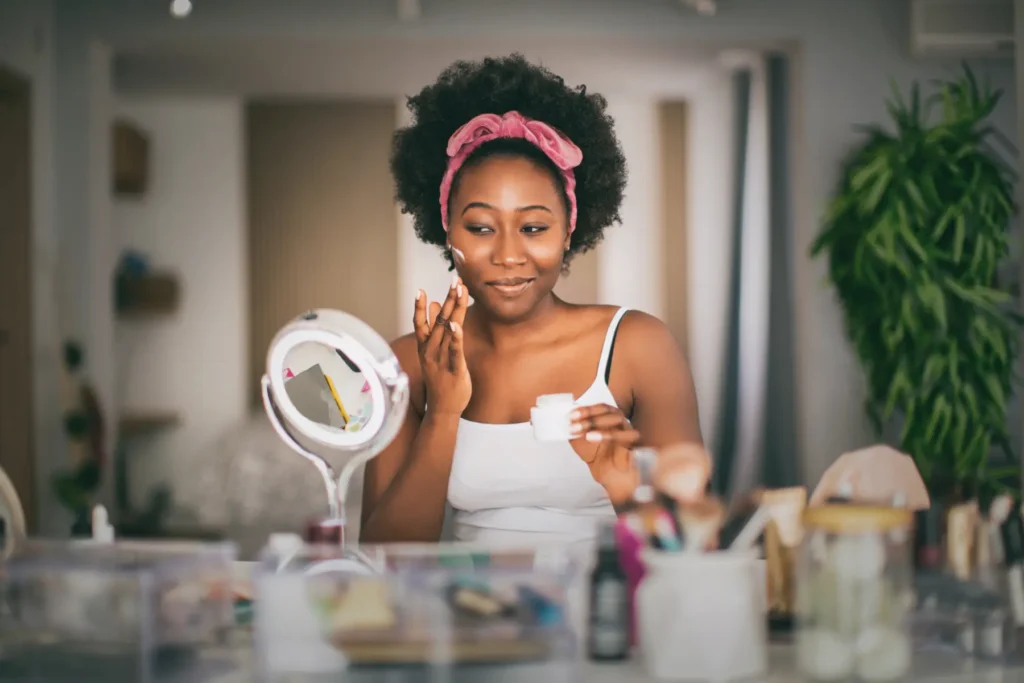Oily skin can be a challenge to manage, but with the right skincare routine, you can achieve a healthy, balanced complexion. Understanding your skin type and tailoring your routine to meet its needs is crucial for maintaining clear and shine-free skin.
Understanding Oily Skin
Before diving into the ultimate skincare routine, it’s essential to understand what causes oily skin.
Causes of Oily Skin Oily skin is primarily caused by overactive sebaceous glands, which produce excess sebum. Several factors can contribute to this overactivity:
- Genetic factors: If your parents have oily skin, you are more likely to have it too.
- Hormonal changes: Fluctuations in hormones, particularly during puberty, menstruation, or pregnancy, can increase oil production.
- Diet and lifestyle: Consuming a diet high in unhealthy fats and sugars, and leading a stressful lifestyle can exacerbate oily skin.
Common Issues Associated with Oily Skin Oily skin often comes with its own set of challenges, including:
- Acne and breakouts: Excess oil can clog pores, leading to pimples and blackheads.
- Enlarged pores: Oily skin often has larger, more visible pores.
- Shiny complexion: Excess oil can create an unwanted shiny or greasy appearance.
Daily Skincare Routine for Oily Skin
A consistent daily skincare routine is crucial for managing oily skin effectively.
Morning Routine
- Cleansing: Start your day with a gentle, foaming cleanser to remove excess oil and impurities. This helps to create a fresh canvas for the rest of your skincare products.
- Toning: Use an alcohol-free toner to balance your skin’s pH levels and remove any residual dirt. Toners with ingredients like witch hazel or salicylic acid are particularly beneficial for oily skin.
- Moisturizing: Opt for a lightweight, oil-free moisturizer to hydrate your skin without clogging pores. Gel-based moisturizers are a great choice for oily skin.
- Sun Protection: Apply a broad-spectrum, non-comedogenic sunscreen to protect your skin from UV damage. Look for sunscreens that are mattifying to help control shine throughout the day.
Evening Routine
- Makeup Removal: Begin with a gentle makeup remover to clear away cosmetics and debris. Micellar water is an effective and gentle option.
Common Mistakes to Avoid (Continued)
Skipping Moisturizer Even oily skin needs hydration, so don’t skip this crucial step. Using a lightweight, oil-free moisturizer helps maintain your skin’s moisture balance without clogging pores.
Using Harsh Products Avoid products with high alcohol content or harsh chemicals that can irritate your skin. Opt for gentle, non-comedogenic formulas designed for oily skin.
Not Wearing Sunscreen Sun protection is essential for all skin types, including oily skin. Look for non-comedogenic, mattifying sunscreens to protect your skin without adding extra shine.
Product Recommendations for Oily Skin
Choosing the right products can make a significant difference in managing oily skin.
Cleansers Look for gentle, foaming cleansers with salicylic acid or benzoyl peroxide. These ingredients help control oil production and prevent breakouts.
Toners Opt for alcohol-free toners with ingredients like witch hazel or tea tree oil. These can help reduce excess oil without drying out your skin.
Moisturizers Select lightweight, oil-free moisturizers with hyaluronic acid or glycerin. These ingredients provide hydration without clogging pores.
Sunscreens Use non-comedogenic sunscreens with SPF 30 or higher. Choose formulas that offer a matte finish to help control shine throughout the day.
Treatments Consider serums and treatments with retinoids, niacinamide, or alpha hydroxy acids (AHAs). These ingredients can help regulate oil production, improve skin texture, and prevent acne.
Advanced Skincare Treatments
For more persistent issues, advanced skincare treatments can provide additional benefits.
Chemical Peels Professional chemical peels can help reduce oiliness and improve skin texture. These treatments remove the top layer of dead skin cells, revealing smoother, clearer skin.
Laser Therapy Laser treatments can target oil-producing glands and reduce acne. This non-invasive procedure can help control sebum production and improve skin clarity.
Microneedling This procedure can help improve skin texture and reduce the appearance of scars and pores. Microneedling stimulates collagen production, promoting healthier, more balanced skin.
Final Thoughts
Managing oily skin requires a balanced approach, combining the right products with healthy lifestyle choices. Consistency is key, and with patience, you can achieve a clearer, healthier complexion.
FAQs
Here are some frequently asked questions about managing oily skin.
Q: Can oily skin benefit from facial oils? Yes, certain facial oils, like jojoba or argan oil, can help balance oil production and provide hydration without clogging pores.
Q: How often should I exfoliate oily skin? It’s recommended to exfoliate oily skin two to three times a week with a gentle chemical exfoliant to avoid over-exfoliation and irritation.
Q: Can I use makeup if I have oily skin? Yes, opt for oil-free, non-comedogenic makeup products. Make sure to remove makeup thoroughly at the end of the day to prevent clogged pores.
Q: Are there any foods that can help reduce oiliness? Foods rich in omega-3 fatty acids, like salmon and walnuts, and antioxidants, like berries and green tea, can help improve skin health and potentially reduce oiliness.
Q: Should I avoid moisturizing if I have oily skin? No, moisturizing is essential even for oily skin. Use a lightweight, oil-free moisturizer to keep your skin hydrated and balanced.
Q: What type of sunscreen is best for oily skin? Choose a non-comedogenic, mattifying sunscreen with SPF 30 or higher to protect your skin without adding extra shine.
By following these guidelines and maintaining a consistent routine, you can effectively manage oily skin and enjoy a clearer, healthier complexion.
